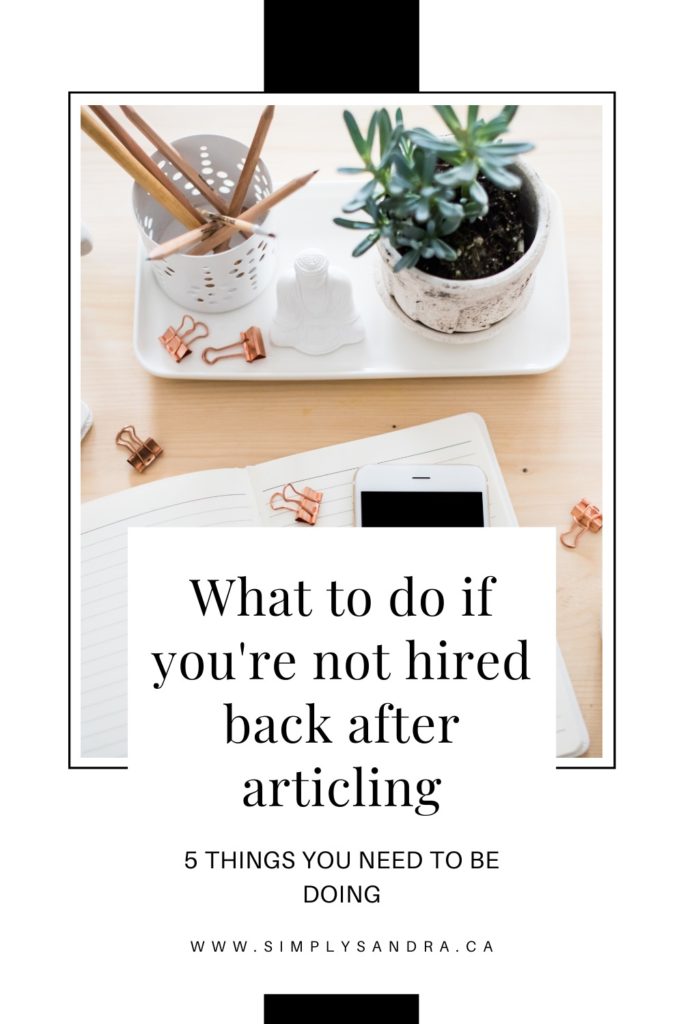
If you’re reading this you likely already know you are not being hired back by your current employer after articling or perhaps you don’t yet have an offer for an associate/counsel position.
I did NOT get hired back by my articling employer and this is a short account of my experience and what you NEED to do and think about at this time if you find yourself in a similar situation.
At this time in 2019 (which is when I completed my articles), I did not have an answer about whether or not I was going to be hired back. I articled in-house at a company that had historically extended associate positions to all of its articling students. To my surprise, I was one of three articling students that were NOT hired back.
I found this information out in April (a month or so prior to the end of my articles). Admittedly, I was ill prepared and was truly not ready for this. Here are my top tips about what to do if you find yourself in this situation and the things I did or wish I knew at the time. I ended up securing a job and I actually started the day after my call (no rest for the wicked I guess).
1. Start planning
My number one tip is to start planning NOW. This is so important. I wish I had started thinking about this earlier at the time. Half way into your articles or even two thirds into the way, you should begin to start making inquires about where you stand and the status of the hire-back decision if this topic has not yet been addressed.
If you don’t have a response then start looking! Do not hesitate. I am a true believer in always looking, even when you at a job that you are happy with. It is so important to just be aware of who is hiring and what jobs are out there. Begin doing this early even when you do not know whether you will be hired back otherwise you will be scrambling later.
I am a planner so I find comfort in having various contingency plans. If you are articling, you are on a contract so you need to accept that things can change. When a company/firm historically hires its students back this just may not be the case for your cohort for whatever reason. Because of this, it is best to be prepared for not being hired back no matter what.
2. Begin applying for jobs
This goes hand in hand with my first point. Begin updating your LinkedIn profile and cleaning up your social media accounts (if your accounts are a mess then you really need to get it together). It is no mystery that in today’s day and age, employers WILL look you up. So if there is anything inappropriate on your online accounts this is the time to remove it.
I highly encourage you to get LinkedIn and indicate that you are open to recruiters contacting you in your settings so that any job opportunities you qualify for will pop up in your feed. Places to look are: LinkedIn, Ontario Reports, Indeed, Neuvoo and Zip Recruiter. Diversify where you are looking and sign up for the alerts so you are always aware of what is out there.
When you are applying for jobs makes sure you take the time to carefully review your application, cover letter and any supporting materials so that it is free of errors or inconsistencies/inaccuracies.
3. Network your way out
Networking is so important, get started as soon as you can establishing your connections at your current place of employment. Make sure you attend any networking events (even on your way out). If you are not being hired back, I understand the tendency to be discourage and unmotivated. However I encourage to put your emotions and feelings aside and think of your future, networking is such a valuable skill especially in this field. Being able to connect and maintain relationships on your way out can lead to countless opportunities in the future.
Going to events also allows you to network with people (that you may not necessarily even work with) which can also lead to a potential job opportunities.
4. Approach people for references and letters
Remember those lawyers that assigned you countless tasks as student? That would go around your principal to give you tons of motions/assignments to do? You did the work and you did not complain, now is your time to ask for a favour. Go to that lawyer and secure a reference and/or a reference letter. I would opt for both.
I suggest that you approach this request as professional as possible. First, ask your potential reference for a meeting (in person or by telephone) and then make sure you are asking verbally. Always ask whether there is anything that you can provide to assist him/her with the reference or reference letter (i.e. your resume). Once you have the confirmation that your reference is secured, send an email confirming and thanking this person for agreeing to be a reference and make sure you have their contact information and preferred method of contact. You want to make it simple and easy for your reference to do this for you.
5. Build your precedent bank
The last thing that you need to do is to gather your work! I am sure by this point you have done tons of motions and pleadings for different lawyers. The routine ones are usually not as important as motions that are more complicated and unique. Any opinions, mediation memos, reports, pleadings and motions you’ve done on complex files for other lawyers – you want to keep this stuff for your personal portfolio and for your own personal reference.
When you begin looking for work you may be asked to provide a writing sample and I find that writing samples prepared in the course of your job are generally more compelling and effective than an academic paper.
These are my top 5 tips and steps you need to take care of on the tail end of your articles to ensure that you are set up for success. For those reading this and are back on the job market, all the best and make sure you take it easy and be kind to yourself during this process.

